英语短语、句型常用搭配
- 格式:docx
- 大小:187.64 KB
- 文档页数:71
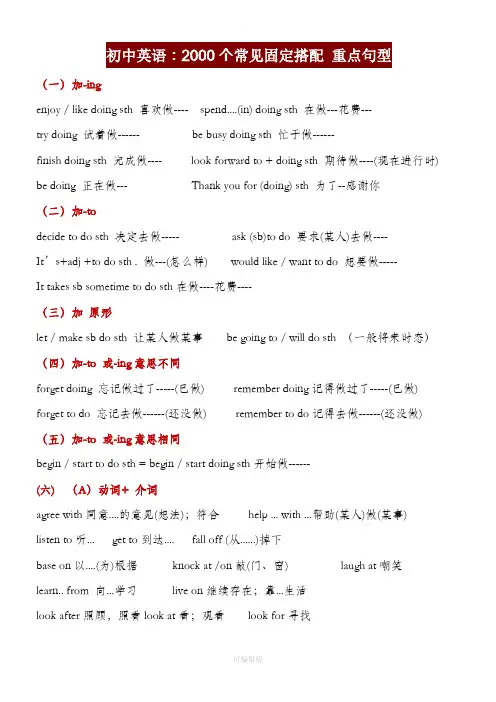
2000(一)加-ingenjoy / like doing sth 喜欢做---- spend....(in) doing sth 在做---花费---try doing 试着做------ be busy doing sth 忙于做------finish doing sth 完成做---- look forward to + doing sth 期待做----(现在进行时) be doing 正在做--- Thank you for (doing) sth 为了--感谢你(二)加-todecide to do sth 决定去做----- ask (sb)to do 要求(某人)去做----It’s+adj +to do sth . 做---(怎么样) would like / want to do 想要做-----It takes sb sometime to do sth在做----花费----(三)加原形let / make sb do sth 让某人做某事be going to / will do sth (一般将来时态)(四)加-to 或-ing意思不同forget doing 忘记做过了-----(已做) remember doing记得做过了-----(已做) forget to do 忘记去做------(还没做) remember to do记得去做------(还没做)(五)加-to 或-ing意思相同begin / start to do sth = begin / start doing sth开始做------(六) (A)动词+ 介词agree with同意....的意见(想法);符合help ... with ...帮助(某人)做(某事) listen to听... get to到达.... fall off (从......)掉下base on以....(为)根据knock at /on敲(门、窗) laugh at嘲笑learn.. from 向...学习live on继续存在;靠...生活look after照顾,照看look at看;观看look for寻找look like看起来像pay for (sth.)付钱;支付point at指示;指向point to指向....prefer to ...宁愿(选择);更喜欢quarrel with (和某人)吵架regard...as ...把....当作....;当作stop...from阻止.....做.....talk about说话;谈话;谈论talk with与......交谈think about考虑think of认为;想起B)动词+ 副词ask for请求;询问carry on坚持下去;继续下去cut down砍倒clean up清除;收拾干净come down下来;落come along来;随同come in进来come on来吧;跟着来;赶快come over过来;顺便来访come out出来;出现;(花)开;发(芽)drop off放下(某物);下车eat up吃光;吃完fall behind落在......后面;输给别人fall down跌倒;从......落下find out查出(真相) get back回来;取回get down下来;落下;把......取下来get off下来;从......下来get on上(车) get up起床give up放弃go on继续go out出去go over过一遍;仔细检查grow up长大;成长hand in交上来hurry up赶快hold on (口语)等一等;(打电话时)不挂断look out留神;注意look over (仔细)检查look up向上看;抬头看pass on传递;转移到.... pick up拾起;捡起put away放好;把....收起来put on穿上;戴上;(戏剧等)上演;放(唱片)等put down把(某物)放下来put up挂起;举起run away流失;逃跑;逃走rush out冲出去set off出发;动身;启程send up发射;把......往上送shut down把......关上sit down坐下slow down减缓;减速take off脱掉(衣服)take out取出throw about乱丢;抛撒trip over (被......)绊倒try on试穿(衣服、鞋等);试戴(帽子等) try out试验;尝试turn down关小;调低turn on打开(电灯、收音机、煤气、自来水)等turn off关(电灯、收音机、煤气、自来水等) turn over (使)翻过来wake up醒来wear out把......穿旧;磨坏work out算出;制订出write down写下....C) be + 形容词+ 介词be angry with对(某人)发脾气be interested in对......感兴趣be able to能;会be afraid of害怕be amazed at对......感到惊讶be excited about对......感到兴奋be filled with用......充满be full of充满......的be good at =do well in在....方面做得好;善于be late for迟到be made in在......生产或制造be made of由....组成;由....be pleased with对......感到满意be proud of以......自豪/高兴be used for用于D)动词+ 名词/ 代词beg one´s pardon请原谅;对不起do morning exercises做早操do one´s homework做作业enjoy oneself =have a good time过得快乐;玩得愉快give a concert开音乐会go boating去划船go fishing去钓鱼go hiking去徒步旅行go skating去滑冰go shopping (去)买东西have a cold (患)感冒have a cough (患)咳嗽have a headache (患)头痛have a try尝试;努力have a look看一看have a rest休息have a seat (= take a seat ) 就坐;坐下have sports进行体育活动have supper吃晚餐hear of听说hold a sports meeting举行运动会make a decision作出决定make a mistake犯错误make a noise吵闹make faces做鬼脸make friends交朋友make money赚钱take one´s place坐某人的座位;代替某人的职务teach oneself (=learn by oneself ) 自学watch TV看电视take photos照相take time花费(时间) take turns轮流E)动词+ 名词/ 代词/ 副词+ 介词catch up with赶上come up with找到;提出(答案、解决办法等)get on well with与......相处融洽give birth to生(孩子)help yourself / yourselves to自取;随便吃make room for给.....腾出地方play a joke on戏弄人;对人恶作剧speak highly of称赞say good bye to告别;告辞take an active part in积极参加take care of照顾;照料;注意F)其他类型be awake醒着的be born出生be busy doing忙着做come true实现do one´s best尽最大努力fall asleep睡觉;入睡go home回家go on doing (sth.)继续做某事;尽力get married结婚get together相聚go straight along 沿着...一直往前走had better (do)最好(做...) keep doing sth.一直做某事make sure确保;确认;查明make up one´s mind下决心1 (see 、hear 、notice 、find 、feel 、listen to 、look at 感官动词)+do eg:I like watching monkeys jump2 (比较级and 比较级)表示越来越怎么样3 a piece of cake =easy 小菜一碟(容易)4 agree with sb 赞成某人5 all kinds of 各种各样a kind of 一样6 all over the world = the whole world 整个世界7 along with同…一道,伴随…eg : I will go along with you我将和你一起去The students planted trees along with their teachers.学生同老师们一起种树8 as soon as 一怎么样就怎么样9 as you can see 你是知道的10 ask for ……求助向…要…(直接接想要的东西)eg : ask you for my book11 ask sb for sth 向某人要什么12 ask sb to do sth 询问某人某事ask sb not to do 叫某人不要做某事13 at the age of 在……岁时eg:I am sixteen.=I am at the age of sixteen.14 at the beginning of …………的起初;……的开始15 at the end of +地点/+时间最后;尽头;末尾eg : At the end of the day.16 at this time of year 在每年的这个时候17 be /feel confident of sth /that clause +从句感觉/对什么有信心,自信eg : I am / feel confident of my spoken English.I feel that I can pass the test.18. be + doing 表:1 现在进行时2 将来时I am watching now. I am going to the zoo tomorrow.19 be able to (+ v 原) = can (+ v 原)能够……eg : She is able to sing She can sing20 be able to do sth 能够干什么eg :She is able to sing.21 be afraid to do /of sth 恐惧,害怕……eg : I'm afraid to go out at night. I'm afraid of dog.22 be allowed to do 被允许做什么eg: I'm allowed to watch TV.我被允许看电视。
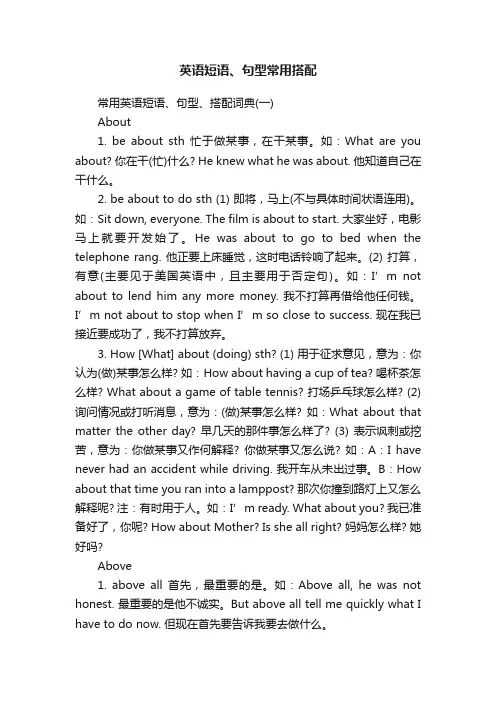
英语短语、句型常用搭配常用英语短语、句型、搭配词典(一)About1. be about sth 忙于做某事,在干某事。
如:What are you about? 你在干(忙)什么? He knew what he was about. 他知道自己在干什么。
2. be about to do sth (1) 即将,马上(不与具体时间状语连用)。
如:Sit down, everyone. The film is about to start. 大家坐好,电影马上就要开发始了。
He was about to go to bed when the telephone rang. 他正要上床睡觉,这时电话铃响了起来。
(2) 打算,有意(主要见于美国英语中,且主要用于否定句)。
如:I’m not about to lend him any more money. 我不打算再借给他任何钱。
I’m not about to stop when I’m so clo se to success. 现在我已接近要成功了,我不打算放弃。
3. How [What] about (doing) sth? (1) 用于征求意见,意为:你认为(做)某事怎么样? 如:How about having a cup of tea? 喝杯茶怎么样? What about a game of table tennis? 打场乒乓球怎么样? (2) 询问情况或打听消息,意为:(做)某事怎么样? 如:What about that matter the other day? 早几天的那件事怎么样了? (3) 表示讽刺或挖苦,意为:你做某事又作何解释? 你做某事又怎么说? 如:A:I have never had an accident while driving. 我开车从未出过事。
B:How about that time you ran into a lamppost? 那次你撞到路灯上又怎么解释呢? 注:有时用于人。
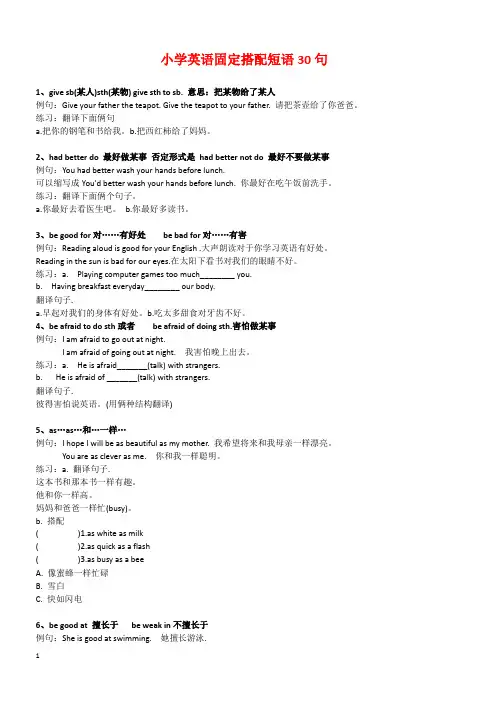
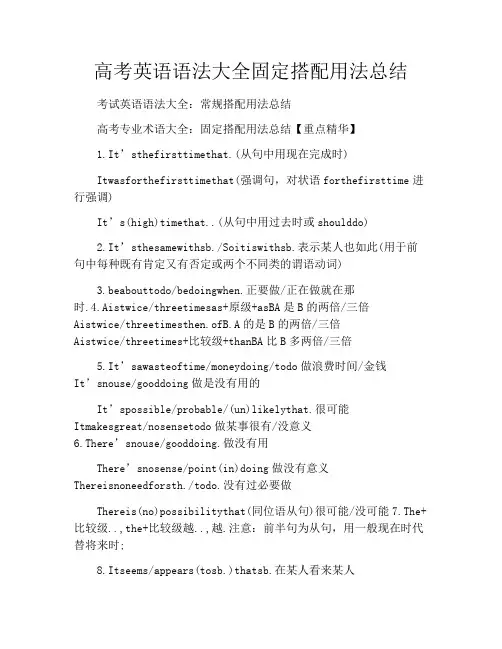
高考英语语法大全固定搭配用法总结考试英语语法大全:常规搭配用法总结高考专业术语大全:固定搭配用法总结【重点精华】1.It’sthefirsttimethat.(从句中用现在完成时)Itwasforthefirsttimethat(强调句,对状语forthefirsttime进行强调)It’s(high)timethat..(从句中用过去时或shoulddo)2.It’sthesamewithsb./Soitiswithsb.表示某人也如此(用于前句中每种既有肯定又有否定或两个不同类的谓语动词)3.beabouttodo/bedoingwhen.正要做/正在做就在那时.4.Aistwice/threetimesas+原级+asBA是B的两倍/三倍Aistwice/threetimesthen.ofB.A的是B的两倍/三倍Aistwice/threetimes+比较级+thanBA比B多两倍/三倍5.It’sawasteoftime/m oneydoing/todo做浪费时间/金钱It’snouse/gooddoing做是没有用的It’spossible/probable/(un)likelythat.很可能Itmakesgreat/nosensetodo做某事很有/没意义6.There’snouse/gooddoing.做没有用There’snosense/point(in)doing做没有意义Thereisnoneedforsth./todo.没有过必要做Thereis(no)possibilitythat(同位语从句)很可能/没可能7.The+比较级..,the+比较级越..,越.注意:前半句为从句,用一般现在时代替将来时;8.Itseems/appears(tosb.)thatsb.在某人看来某人=Sb.seems/appearstobe/todo/tobedoing/tohavedone..Itseems/look sasif.好象/似乎..9.It(so)happenedthatsb...某人碰巧..=Sb.happenedtobe/todo/tobedoing/tohavedone..10.Itissaid/thought/believed/hoped/supposed.thatsb=Sb.issaidt obe/todo/tobedoing/tohavedone.(注意:这种句型里如带动词hope 则不能变成简单句,因为无hopesb.todo结构)[要学习网一直在为调动你的学习积极性而努力]12..such.that.如此.以致于(引导结果状语从句).such..as像..的这种(as为关系代词,引导定语从句,在从句里充当主、宾、表)13.DoyoumindifIdosth.?/WouldyoumindifIdidsth.?你介意我做吗?14.Thechanceisthat../(The)Chancesarethat.很可能.15.Check/Makesure/Seetoit/Seethat..(从句中常用一般现在之时)确信/务必..16.dependonitthat..取决于seetoitthat.负责/设法做到.注意:除了except/but/in等介词可以直接接that从句,其它介词后必须用it做形式宾语;17.Itis/was+介词短语/从句/名词/代词等+thatHow/When/Where/Whyis/wasitthat..?注意:此句型为强调句,当被强调的为指出人的词时,还可用who 连接;强调主语时,定冠词从句后的谓语动词应与前面的主语保持一致;注意与定语从句的区别)18.Howisitthat..(这几个句式都表示“怎么会.?”“怎么发生的?”)He+从句?Howdoes/eabout?(Howdiditcomeaboutthat.?)如:Heyouarelateagain?19.Thereseems/appears/happenstobe/mustbe/can’tbe/is(are,was, were)saidtobe/is(are,was,were)thoughttobe.表示“.似乎有/碰巧有/一定有/不可能有/据说有/认为有..”介词(如of)therebeingwant/wish/expecttheretobe要/希望/期待有..adj./adv.enoughfortheretobe.足够.会有.注意:therebeing/theretobe为therebe的非谓语形式;Itissaid/thoughtthatthereis/are=Thereis/was/are/weresaid(t hought)tobe.如:Eg:Ihaveneverdreamoftherebeingsuchagoodchanceforme.Itwon’tbe coldenoughfortheretobeafrosttonight.20.疑问词+插入语+陈述语序?Eg:Whodoyouthinkhe’llhaveattendthemeeting?21.Butfor+n./pron.,sb./sth.would(not)havedone..要不是.,某人早就(表示虚拟语气)=Ifithadnotbeenfor..,./Iftherehadnotbeen..22.Itwon(’t)belongbefore+从句(从句中用一般现如今时)不久/很久就要.Itwas(not)longbefore+从句(从句中用一般过去之时)不久/很久才..23.Thosewho.(从句及主句中会复数谓语动词用复数形式).Anyonewho=Whoever..(从句及主句中谓语介词用单数单数形式)24.主句(一般现在时或最近时)...when从句.(might/shoulddo或might/shouldhavedone)表示”对比”,意思为“本该(可)而却”,主句中为陈述语气,从句里为虚拟语气Eg:Whyareyouherewhenyoushouldbeinschool?你本该上学的怎么在这儿?Hestoppedtryingwhenhemighthavesucceeded.本该已成功了他却停止努力了.25.Thereis./Sb.havenodoubtthat(同位语从句,that不可省略)毫无疑问Thereis/Sb.havesomedoubtwhether..(同位语从句不可用if)不确定是否Sb.doubtif/whether.某人怀疑是否Sb.don’tdoubtthat某人不怀疑26.immediately/directly/instantly/themoment+从句on/upon+n./doingNosoonerhadsb.donethan.(过去时)Hardlyhadsb.donewhen..(过去时)注意:这几个结构都表示“一.就”;27.everytime/eachtime/thelasttime/thefirsttime/nexttime+从句(名词性短语引导一个时间状语句)anywhere/everywhere+从句(相当于wherever引导的地点状语从句)Eg:Youcangoanywhereyoulike.Nexttimeye,pleasebringyoursonalong.28.Ifonly/Iwish+从句(用过去类时态)表示虚拟语气,“要是.就好了”“但愿就好了!”29.Considering+n.或pron.或that从句/Seeingthat.考虑到/鉴于.Given+n./pron作状语,表示“在有的情况下”“如果有”“假定”,有时也表示”考虑到”Eg:Seeing(that)herefusedtohelpus,thereisnoreasonwhyweshouldhe lphiGivengoodhealth,Ihopetofinishtheworkthisyear.Giventheirinexpe rience/thattheyareinexperienced,they’vedoneagoodjob.30.There wasatimewhen.曾经有那么一度.31.otherthan与no,not,none等否定词连用,表示肯定意思,如:Eg:ItwasnoneotherthanMr.Smith.这正是Smith先生.32.Notuntil.did/do/does/willsb.doItwas/isnotuntilthatsb33.It’s(un)likesb.todo/tohavedone做某事很像某人/做某事可不像某人34.ItremainstobeseenWh--words..是否.还有待于看.(不用that,if作连接词)35.Itonlyremainsforsb.todo剩余的只是要某人做某事.Eg:We’vegoteverythingready.Itonlyremainsforyoutocometodinner .36.Onemoment.,andnow刚才一会儿还在做而现在却..37.Notall/both/everyone表示部分否定38.Suchis/are..这(些)就是.(谓语代词单复数由后面名词决定)39.I’drather(not)do/havedone我宁愿..I’drather+从句(从句中用过去时或过去完成时)40.It’simportant/necessary/strange/surprising.+that(用陈述语气或shoulddo)41.Ilike/hate/appreciateitthat/when等从句(it表示后面从句的这种情况)Eg:Iappreciateitifyouwillgivemeahand.42.Bythetime+从句(一般现在时/过去时),主句(将来完成时/过去完成时)43.,asisoftenthecasewithsb./asisusualwithsb.(as引导非限制性定语从句)44incase/lest/forfearthat.(从句中用陈述言语或shoulddo)45.While置于句首可表示Aslongas或AlthoughEg:Whilethereislifethereishope.[要学习网一直在为调动你的学习积极性而努力]WhileIadmithisgoodpoints,Icanseehisbadones.46.cannot(never)too+adj.(adv.)/adj.(adv.)+enough“越越好”“非常”too+adj.(anxious/eager/willing/ready/glad等)+todo.表示肯定意思Eg:Ican’tthankyouenough.我非常感激你.Hewastoogladtoseehisfather.=Hewasverygladtoseehisfather.47.no t/neve等表示否定的词与比较级连用表示最高级,如:Eg:-----Doyouagreewithhissuggestion?-------Ican’tagreemore.48.Whatif..要是.怎么办?Eg:Whatifhedoesn’tcometomorrow?49.more..than与其.不如..Eg:Heismorenervousthanfrightened.50.Itis/hasbeen+一段时间+since从句(从句中如为延续性动词,则实际透露的意思相反)Eg:Itistwoyearssincehedrank.他不能喝酒已两年了.高考英语语法大全:固定搭配用法阐述(一)1.It’sthefirsttimethat(从句中用现在完成时)Itwasforthefirsttimethat(强调句,对状语forthefirsttime进行强调)It’s(high)timethat(从句中用过去时或shoulddo)2.It’sthesamewithsb/Soitiswithsb表示某人也如此(前句中既有肯定又有否定或两个不同类的谓语动词)3.beabouttodo/bedoingwhen正要做/正在做就在那时4.Aistwice/threetimesas+原级+asBA是B的两倍/三倍Aistwice/threetimesthen.ofB.A的是B的两倍/三倍Aistwice/threetimes+比较级+thanBA比B多两倍/三倍5.It’sawasteoftime/moneydoing/todosth做浪费时间/金钱It’snouse/gooddoing做是没有用的It’spossible/probable/(un)likelythat很可能Itmakesgreat/nosensetodo做某事很有/没意义6.There’snouse/gooddoing做没有用There’snosense/point(in)doing做没有意义Thereisnoneedforsth/todo没有过必要做Thereis(no)possibilitythat(同位语从句)很可能/没可能7.The+比较级,the+比较级越,越注意:前半句为从句,用一般现在时代替从今以后时;8.Itseems/appears(tosb)thatsb在某人看来某人=Sb.seems/appearstobe/todo/tobedoing/tohavedoneItseems/looksa sif好象/似乎9.It(so)happenedthatsb某人碰巧=Sb.happenedtobe/todo/tobedoing/tohavedone10.Itissaid/thought /believed/hoped/supposedthatsb=Sb.issaidtobe/todo/tobedoing/t ohavedone(注意:这种片语里如带动词hope则不能变成简单句,因为无hopesb.todo结构)12.suchthat如此以致于(引导结果状语从句)suchas像的这种(as为关系代词,引导定语从句,在从句里充当主、宾、表)13.DoyoumindifIdosth.?/WouldyoumindifIdidsth.?你介意我做吗?14.Thechanceisthat/(The)Chancesarethat很可能15.Check/Makesure/Seetoit/Seethat(从句中所常用一般现在时)确信/务必16.dependonitthat取决于seetoitthat负责/设法做到注意:除了except/but/in等介词可以直接留that从句,其它介词后必须用it做形式宾语;17.Itis/was+介词短语/从句/名词/代词等+thatHow/When/Where/Whyis/wasitthat?注意:此句型为强调句,当被强调的为表示人的词时,还可用who 连接;强调主语时,上面从句后的谓语动词应与前面的主语保持一致;注意与定语从句的区别)18.Howisitthat(这几个句型都表示“怎么会?”“怎么发生的?”)He+从句?Howdoes/eabout?(Howdiditcomeaboutthat?)如:Heyouarelateagain?19.Thereseems/appears/happenstobe/mustbe/can’tbe/is(are,was, were)saidtobe/is(are,was,were)thoughttobe表示“.似乎有/碰巧有/一定有/不可能有/据说有/认为有”介词(如of)therebeingwant/wish/expecttheretobe要/希望/期待有adj./adv.enoughfortheretobe足够会有注意:therebeing/theretobe为therebe的非谓语形式;Itissaid/thoughtthatthereis/are=Thereis/was/are/weresaid(t hought)tobe如:Eg:They’veneverdreamoftherebeingsuchagoodchanceforme.Itwon’tbecoldenoughfortheretobeafrosttonight.20.疑问词+插入语+陈述语序?Eg:Whodoyouthinkhe’llhaveattendthemeeting?高考英语语法大全:固定搭配用法总结(二)21.Butfor+n/pron,sb./sth.would(not)havedone不是,某人早就(表示虚拟语气)=Ifithadnotbeenfor/Iftherehadnotbeen22.Itwon(’t)belongbefore+从句(从句中用一般现在时)不久/很久就要Itwas(not)longbefore+从句(从句中用一般过去时)不久/很久才23.Thosewho(从句及主句中谓语动词用复数形式).Anyonewho=Whoever(从句谓语及主句中谓语动词用单数方式)24主句(一般现在时或过往时)when从句(might/shoulddo或might/shouldhavedone)表示”对比”,意思为“本该(可)而却”,主句中为陈述语气,从句里为虚拟语气Eg:Whyareyouherewhenyoushouldbeinschool?你峭腹上学的怎么在这儿?Hestoppedtryingwhenhemighthavesucceeded.本该已成功了他却停止努力了.25.Thereis/Sbhavenodoubtthat(同位语从句,that不可省略)毫无疑问Thereis/Sbhavesomedoubtwhether(同位语从句不可用if)不确定是否Sb.doubtif/whether某人怀疑是否Sb.don’tdoubtthat某人不怀疑26.immediately/directly/instantly/themoment+从句on/upon+n./doingNosoonerhadsb.donethan(过去时)Hardlyhadsb.donewhen(过去时)注意:这几个结构都表示“一就”;27.everytime/eachtime/thelasttime/thefirsttime/nexttime+从句(名词性短语引导一个时间棒状语句)anywhere/everywhere+从句(相当于wherever引导的地点状语从句)Eg:Youcangoanywhereyoulike.Nexttimeye,pleasebringyoursonalong.28.Ifonly/Iwish+从句(用过去类时态)表示虚拟语气,“要是就好了”“但愿就好了!”29.considering+n.或pron.或that从句/seeingthat考虑到/鉴于Given+n./pron作状语,表示“在有的情况下”“如果有”“假定”,有时也表示”考虑到”Eg:Seeing(that)herefusedtohelpus,thereisnoreasonwhyweshouldhe lphiGivengoodhealth,Ihopetofinishtheworkthisyear.Giventheirinexperience/thattheyareinexperienced,they’vedonea goodjob.30.Therewasatimewhen曾经有那么一度31.otherthan与no,not,none等否定词连用,表示肯定意思,如:Eg:ItwasnoneotherthanMr.Smith.这正是Smith先生.32.Notuntildid/do/does/willsb.doItwas/isnotuntilthatsb33.It’s(un)likesb.todo/tohavedone做某事很像某人/做某事可不像某人34.ItremainstobeseenWh-words是否还有待于看.(不用that,if作连接词)35.Itonlyremainsforsb.todo剩下的只是要某人做某事.Eg:We’vegoteverythingready.Itonlyremainsforyoutocometodin ner.高考英语语法大全:下挂搭配用法总结(三)36.Onemoment,andnow刚才一会儿还在做而现在却37.Notall/both/everyone表示部分否定38.Suchis/are这(些)就是(谓语动词单复数由词语后面名词决定)39.I’drather(not)do/h avedone我宁愿..I’drather+从句(从句譬如过去定冠词时或过去完成时)40.It’simportant/necessary/strange/surprisingthat(用陈述语气或shoulddo)41.Ilike/hate/appreciateitthat/when等从句(it表示后面从句的这种情况)Eg:Iappreciateitifyouwillgivemeahand.42.bythetime+从句(一般现在时/过去时),主句(将来完成时/过去完成时)43.asisoftenthecasewithsb./asisusualwithsb.(as引导而非限制性定语从句)44incase/lest/forfearthat(从句中用陈述语气或shoulddo)45.While置于句首可表示Aslongas或AlthoughEg:Whilethereislifethereishope.WhileIadmithisgoodpoints,Icanseehisbadones.46.cannot(never)too+adj(a dv)/adj(adv)+enough“越越好”“非常”too+adj(anxious/eager/willing/ready/glad等)+todo表示肯定意思Eg:Ican’tthankyouenough.我非常感激你.Hewastoogladtoseehisfather.=Hewasverygladtoseehisfather.47.no t/never等表示否定的词与比较级连用表示最高级,如:Eg:--Doyouagreewithhissuggestion?--Ican’tagre emore.48.Whatif要是怎么办?Eg:Whatifhedoesn’tcometomorrow?49.morethan与其不如Eg:Heismorenervousthanfrightened.50.Itis/hasbeen+一段时间+since从句(从句中如为延续性动词,则实际表示的意思相反)Eg:Itistwoyearssincehedrank.他不喝酒已两年了.。
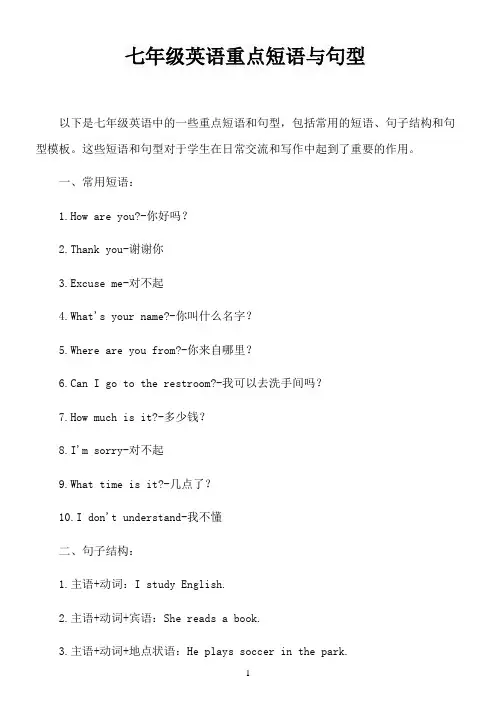
七年级英语重点短语与句型以下是七年级英语中的一些重点短语和句型,包括常用的短语、句子结构和句型模板。
这些短语和句型对于学生在日常交流和写作中起到了重要的作用。
一、常用短语:1.How are you?-你好吗?2.Thank you-谢谢你3.Excuse me-对不起4.What's your name?-你叫什么名字?5.Where are you from?-你来自哪里?6.Can I go to the restroom?-我可以去洗手间吗?7.How much is it?-多少钱?8.I'm sorry-对不起9.What time is it?-几点了?10.I don't understand-我不懂二、句子结构:1.主语+动词:I study English.2.主语+动词+宾语:She reads a book.3.主语+动词+地点状语:He plays soccer in the park.4.主语+动词+时间状语:We have class at 8 o'clock.5.主语+动词+宾语+地点状语:They eat dinner at home.三、句型模板:1.What+be+主语+like?-询问某人的外貌或性格特征。
Example:What is your sister like?-你妹妹长什么样?2.Can+主语+动词原形?-提出请求或询问能力。
Example:Can you help me?-你能帮我吗?3.How+be+主语?-询问某人的状态或感觉。
Example:How are you?-你好吗?4.What+do+主语+like?-询问某人的爱好或喜欢的事物。
Example:What does she like to do?-她喜欢做什么?5.Why+do/does+主语+动词原形?-询问原因或理由。
Example:Why do they go to the park?-他们为什么去公园?通过以上的短语和句型,学生可以在日常交流和写作中灵活运用。
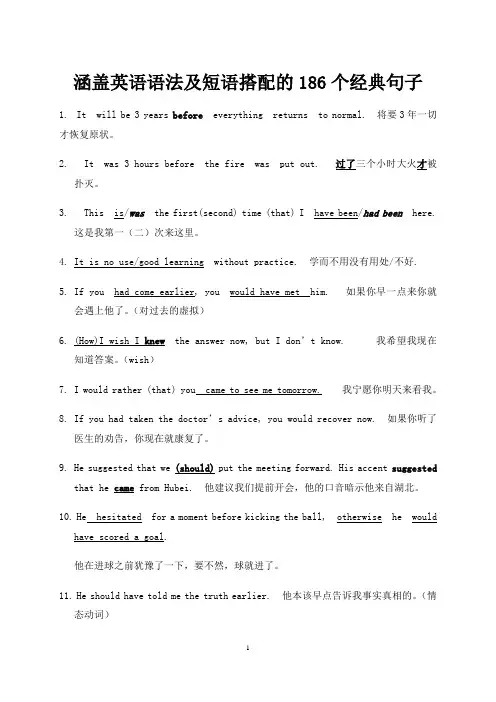
涵盖英语语法及短语搭配的186个经典句子1.It will be 3 years before everything returns to normal. 将要3年一切才恢复原状。
2.It was 3 hours before the fire was put out. 过了三个小时大火才被扑灭。
3.This is/was the first(second) time (that) I have been/had been here.这是我第一(二)次来这里。
4.It is no use/good learning without practice. 学而不用没有用处/不好.5.If you had come earlier, you would have met him. 如果你早一点来你就会遇上他了。
(对过去的虚拟)6.(How)I wish I knew the answer now, but I don’t know.我希望我现在知道答案。
(wish)7.I would rather (that) you came to see me tomorrow. 我宁愿你明天来看我。
8.If y ou had taken the doctor’s advice, you would recover now.如果你听了医生的劝告,你现在就康复了。
9.He suggested that we (should)put the meeting forward. His accent suggestedthat he came from Hubei. 他建议我们提前开会,他的口音暗示他来自湖北。
10.He hesitated for a moment before kicking the ball, otherwise he wouldhave scored a goal.他在进球之前犹豫了一下,要不然,球就进了。
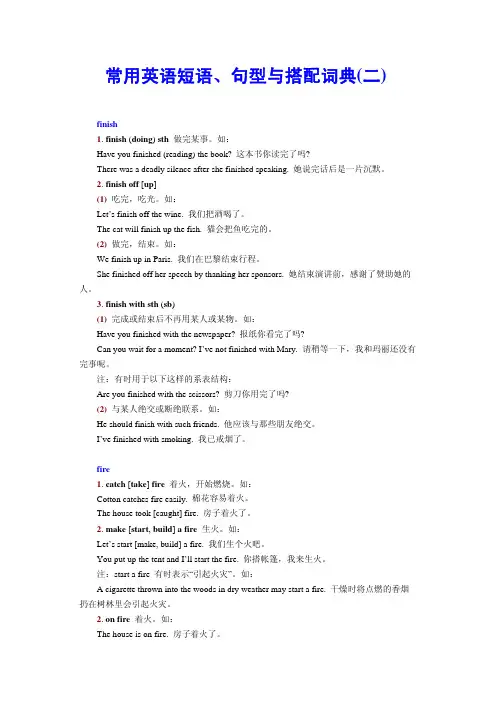
常用英语短语、句型与搭配词典(二)finish1. finish (doing) sth做完某事。
如:Have you finished (reading) the book? 这本书你读完了吗?There was a deadly silence after she finished speaking. 她说完话后是一片沉默。
2. finish off [up](1) 吃完,吃光。
如:Let’s finish off the wine. 我们把酒喝了。
The cat will finish up the fish. 猫会把鱼吃完的。
(2) 做完,结束。
如:We finish up in Paris. 我们在巴黎结束行程。
She finished off her speech by thanking her sponsors. 她结束演讲前,感谢了赞助她的人。
3. finish with sth (sb)(1) 完成或结束后不再用某人或某物。
如:Have you finished with the newspaper? 报纸你看完了吗?Can you wait for a moment? I’ve not finished with Mary. 请稍等一下,我和玛丽还没有完事呢。
注:有时用于以下这样的系表结构:Are you finished with the scissors? 剪刀你用完了吗?(2) 与某人绝交或断绝联系。
如:He should finish with such friends. 他应该与那些朋友绝交。
I’ve finished with smoking. 我已戒烟了。
fire1. catch [take] fire着火,开始燃烧。
如:Cotton catches fire easily. 棉花容易着火。
The house took [caught] fire. 房子着火了。
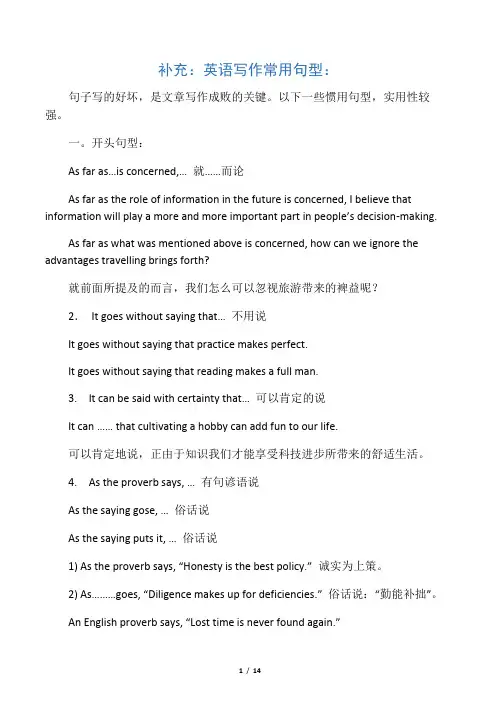
补充:英语写作常用句型:句子写的好坏,是文章写作成败的关键。
以下一些惯用句型,实用性较强。
一。
开头句型:As far as…is concerned,… 就……而论As far as the role of information in the future is concerned, I believe that information will play a more and more important part in people’s decision-making.As far as what was mentioned above is concerned, how can we ignore the advantages travelling brings forth?就前面所提及的而言,我们怎么可以忽视旅游带来的裨益呢?2.It goes without saying that… 不用说It goes without saying that practice makes perfect.It goes without saying that reading makes a full man.3. It can be said with certainty that… 可以肯定的说It can …… that cultivating a hobby can add fun to our life.可以肯定地说,正由于知识我们才能享受科技进步所带来的舒适生活。
4. As the proverb says, … 有句谚语说As the saying gose, … 俗话说As the saying puts it, … 俗话说1) As the proverb says, “Honesty is the best policy.” 诚实为上策。
2) As………goes, “Diligence makes up for deficiencies.” 俗话说:“勤能补拙”。
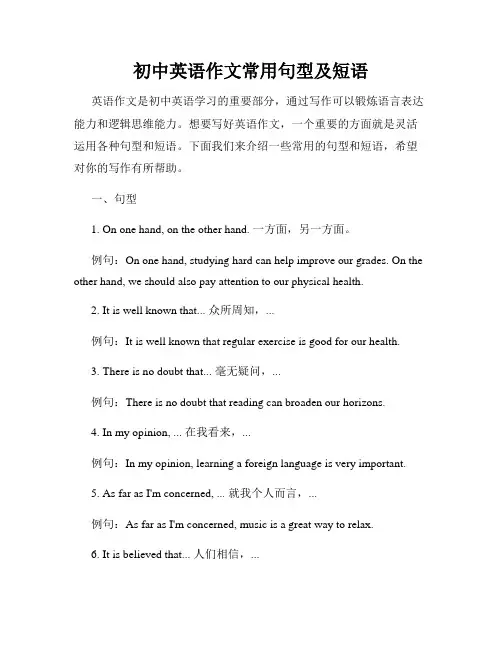
初中英语作文常用句型及短语英语作文是初中英语学习的重要部分,通过写作可以锻炼语言表达能力和逻辑思维能力。
想要写好英语作文,一个重要的方面就是灵活运用各种句型和短语。
下面我们来介绍一些常用的句型和短语,希望对你的写作有所帮助。
一、句型1. On one hand, on the other hand. 一方面,另一方面。
例句:On one hand, studying hard can help improve our grades. On the other hand, we should also pay attention to our physical health.2. It is well known that... 众所周知,...例句:It is well known that regular exercise is good for our health.3. There is no doubt that... 毫无疑问,...例句:There is no doubt that reading can broaden our horizons.4. In my opinion, ... 在我看来,...例句:In my opinion, learning a foreign language is very important.5. As far as I'm concerned, ... 就我个人而言,...例句:As far as I'm concerned, music is a great way to relax.6. It is believed that... 人们相信,...例句:It is believed that hard work leads to success.7. Nowadays, ... 如今,...例句:Nowadays, more and more people are using smartphones.8. With the development of society, ... 随着社会的发展,...例句:With the development of society, people's lives have become more convenient.二、短语1. In conclusion 总之例句:In conclusion, we should take advantage of our time and work hard.2. As a result 结果例句:He studied hard for the exam, and as a result, he got a high score.3. According to 根据例句:According to the survey, most students prefer playing sports to watching TV.4. It's worth noting that 值得注意的是例句:It's worth noting that learning from mistakes is important for personal growth.5. In addition 此外例句:In addition, we should also take care of the environment.6. On the contrary 相反地例句:Many people think that money is the key to happiness, but on the contrary, it is not true.7. In my point of view 在我看来例句:In my point of view, a healthy lifestyle is the foundation of success.8. In a word 总而言之例句:In a word, practice makes perfect.通过运用这些常用的句型和短语,我们可以使我们的英语作文更加丰富多样,更具有说服力。
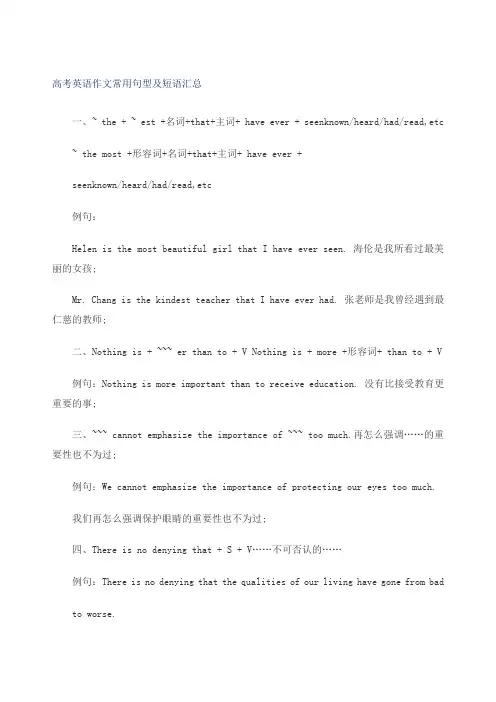
高考英语作文常用句型及短语汇总一、~ the + ~ est +名词+that+主词+ have ever + seenknown/heard/had/read,etc~ the most +形容词+名词+that+主词+ have ever +seenknown/heard/had/read,etc例句:Helen is the most beautiful girl that I have ever seen. 海伦是我所看过最美丽的女孩;Mr. Chang is the kindest teacher that I have ever had. 张老师是我曾经遇到最仁慈的教师;二、Nothing is + ~~~ er than to + V Nothing is + more +形容词+ than to + V例句:Nothing is more important than to receive education. 没有比接受教育更重要的事;三、~~~ cannot emphasize the importance of ~~~ too much.再怎么强调……的重要性也不为过;例句:We cannot emphasize the importance of protecting our eyes too much.我们再怎么强调保护眼睛的重要性也不为过;四、There is no denying that + S + V……不可否认的……例句:There is no denying that the qualities of our living have gone from badto worse.不可否认的,我们的生活品质已经每况愈下;五、It is universally acknowledged that +句子~~全世界都知道……例句:It is universally acknowledged that trees are indispensable to us.全世界都知道树木对我们是不可或缺的;六、There is no doubt that +句子~~毫无疑问的……例句:There is no doubt that our educational system leaves something to be desired.毫无疑问的我们的教育制度令人不满意;七、An advantage of ~~~ is that +句子……的优点是……例句:An advantage of using the solar energy is that it won't createproduceany pollution.使用太阳能的优点是它不会制造任何污染;八、The reason why +句子~~~ is that +句子……的原因是……例句:The reason why we have to grow trees is that they can provide us with fresh air.The reason why we have to grow trees is that they can supply fresh air for us.我们必须种树的原因是它们能供应我们新鲜的空气;九、So +形容词+ be +主词+ that +句子如此……以致于……例句:So precious is time that we can't afford to waste it.时间是如此珍贵,我们经不起浪费它;十、Adj + as + Subject主词+ be,S + V~~~虽然……例句:Rich as our country is, the qualities of our living are by no meanssatisfactory. {by no means = in no way = on no account一点也不}虽然我们的国家富有,我们的生活品质绝对令人不满意;十一、The + ~er + S + V,~~~ the + ~er + S + V ~~~The + more + Adj + S + V,~~~ the + more + Adj + S + V ~~~愈……愈……例句:The harder you work,the more progress you make. 你愈努力,你愈进步;The more books we read,the more learned we become. 我们书读愈多,我们愈有学问;十二、By +Ving,~~ can ~~借着……,……能够…… 例句:By taking exercise,we can always stay healthy. 借着做运动,我们能够始终保持健康;十三、~~~ enable + Object受词+ to + V……使……能够……例句:Listening to music enable us to feel relaxed. 听音乐使我们能够感觉轻松;十四、On no account can we + V ~~~我们绝对不能……例句:On no account can we ignore the value of knowledge.我们绝对不能忽略知识的价值;十五、It is time + S +过去式该是……的时候了例句:It is time the authorities concerned took proper steps to solve thetraffic problems.该是有关当局采取适当的措施来解决交通问题的时候了;十六、Those who ~~~……的人……例句:Those who violate traffic regulations should be punished.违反交通规定的人应该受处罚;十七、There is no one but ~~~没有人不……例句:There is no one but longs to go to college. 没有人不渴望上大学;十八、be + forced/compelled/obliged + to + V不得不……例句:Since the examination is around the corner,I am compelled to give updoing sports.既然考试迫在眉睫,我不得不放弃做运动;十九、It is conceivable that +句子可想而知的It is obvious that +句子明显的It is apparent that +句子显然的例句:It is conceivable that knowledge plays an important role in our life.可想而知,知识在我们的一生中扮演一个重要的角色;二十、That is the reason why ~~~那就是……的原因例句:Summer is sultry. That is the reason why I don't like it.夏天很燠热;那就是我不喜欢它的原因;二十一、For the past +时间,S +现在完成式……过去……年来,……一直……例句:For the past two years,I have been busy preparing for the examination.过去两年来,我一直忙着准备考试;二十二、Since + S +过去式,S +现在完成式;例句:Since he went to senior high school,he has worked very hard.自从他上高中,他一直很用功;二十三、It pa ys to + V ~~~……是值得的;例句:It pays to help others. 帮助别人是值得的;二十四、be based on以……为基础例句:The progress of thee society is based on harmony. 社会的进步是以和谐为基础的;二十五、Spare no effort to + V不遗余力的例句:We should spare no effort to beautify our environment.我们应该不遗余力的美化我们的环境;二十六、bring home to +人+事让……明白……事例句:We should bring home to people the value of working hard.我们应该让人们明白努力的价值;二十七、be closely related to ~~与……息息相关例句:Taking exercise is closely related to health. 做运动与健康息息相关;二十八、Get into the habit of + Ving = make it a rule to + V养成……的习惯例句:We should get into the habit of keeping good hours. 我们应该养成早睡早起的习惯;二十九、Due to/Owing to/Thanks to + N/Ving,~~~因为……例句:Thanks to his encouragement,I finally realized my dream.因为他的鼓励,我终于实现我的梦想;三十、What a + Adj + N + S + V= How + Adj + a + N + V多么……例句:What an important thing it is to keep our promiseHow important a thing it is to keep our promise遵守诺言是多么重要的事三十一、Leave much to be desired令人不满意例句:The condition of our traffic leaves much to be desired. 我们的交通状况令人不满意;三十二、Have a great influence on ~~~对……有很大的影响例句:Smoking has a great influence on our health. 抽烟对我们的健康有很大的影响;三十三、do good to对……有益,do harm to对……有害例句:Reading does good to our mind. 读书对心灵有益;Overwork does harm to health. 工作过度对健康有害;三十四、Pose a great threat to ~~对……造成一大威胁例句:Pollution poses a great threat to our existence. 污染对我们的生存造成一大威胁;三十五、do one's utmost to + V = do one’s best尽全力去……例句:We should do our utmost to achieve our goal in life.我们应尽全力去达成我们的人生目标. 不用说…It goes without saying that从句 = It is needless to say that从句 = It is obvious that从句 = Obviously, S. + V. 例∶不用说早睡早起是值得的; It goes without saying that it pays to keep early hours.2. 我深信… I am greatly convinced that从句 = I am greatly assured that从句例∶我深信预防好于治疗; I am greatly convinced that prevention is better than cure.3. 在各种…之中…Among various kinds of …, …= Of all the …, … 例∶在各种运动中我尤其喜欢慢跑; Among various kinds of sports, I like jogging in particular.4. …是很容易证明的;It can be easily proved that从句例∶时间最珍贵是很容易证明的; It can be easily proved that nothing is more precious than time.5. …无论如何强调都不为过;… cannot be overemphasized 例∶交通安全的重要性无论如何强调都不为过; The importance of traffic safety cannot be overemphasized.6. 就我的看法…;我认为…In my opinion, …= To my mind, ….= As far as I am concerned, … 例∶就我的看法打电动玩具既花费时间也有害健康; In my opinion, playing video games not only takes much time but is also harmful to health.7. A 每个人都知道… Everyone knows that从句=It’s well-known that =As we all know,…B 就我所知…As far as my knowledge is concerned, … 例∶就我所知下列方法对我帮助很大; As far as my knowledge is concerned, the following ways are of great help to me.8. 毫无疑问地…There is no doubt that从句例∶毫无疑问地近视在我国的年轻人中是一个严重的问题; There is no doubt that near-sightedness is a serious problem among the youth of our country.9. 根据我个人经验…According to my personal experience, … = Based on my personal experience, … 例∶根据我个人经验微笑已带给我许多好处; According to my personal experience,smile has done me a lot of good.10. 在我认识的人当中也许没有一个人比…更值得我尊敬; Of all the people I know, perhaps none deserves my respect more than … 例∶在我认识的人当中也许没有一个人比我的英文老师张老师更值得我尊敬; Of all the people I know, perhaps none deserves my respect more than Miss Chang, my English teacher.11. A 随着人口的增加… With the increase/growth of the population, …B 随着科技的进步, … With the advance of science and technology, … 例∶随着台湾经济的快速发展许多社会问题产生了; With the rapid development of Taiwan's economy, a lot of social problems have come to pass.补:1、Those who ~~~ ...的人...例句:Those who violate traffic regulations should be punished.违反交通规定的人应该受处罚;2、There is no one but ~~~ 没有人不...例句:There is no one but longs to go to college.没有人不渴望上大学;3、be + forced/compelled/obliged + to + V 不得不...例句:Since the examination is around the corner, I am compelled to give up doing sports.既然考试迫在眉睫,我不得不放弃做运动;4、It is conceivable that + 句子可想而知的It is obvious that + 句子明显的It is apparent that + 句子显然的例句:It is conceivable that knowledge plays an important role in our life.可想而知,知识在我们的一生中扮演一个重要的角色;5、That is the reason why ~~~ 那就是...的原因例句:Summer is sultry. That is the reason why I don't like it.夏天很燠热;那就是我不喜欢它的原因;6、For the past + 时间,S + 现在完成式...过去...年来,...一直...例句:For the past two years, I have been busy preparing for the examination.过去两年来,我一直忙着准备考试;7、Since + S + 过去式,S + 现在完成式;例句:Since he went to senior high school, he has worked very hard.自从他上高中,他一直很用功;8、It pays to + V ~~~ ...是值得的;例句:It pays to help others.帮助别人是值得的;9、be based on 以...为基础例句:The progress of thee society is based on harmony.社会的进步是以和谐为基础的;10、Spare no effort to + V 不遗余力的例句:We should spare no effort to beautify our environment.我们应该不遗余力的美化我们的环境;11、bring home to + 人 + 事让...明白...事例句:We should bring home to people the value of working hard.我们应该让人们明白努力的价值;12、be closely related to ~~ 与...息息相关例句:Taking exercise is closely related to health.做运动与健康息息相关;13、Get into the habit of + Ving = make it a rule to + V 养成...的习惯We should get into the habit of keeping good hours.我们应该养成早睡早起的习惯;14、Due to/Owing to/Thanks to + N/Ving, ~~~ 因为...例句:Thanks to his encouragement, I finally realized my dream.因为他的鼓励,我终于实现我的梦想;15、What a + Adj + N + S + V= How + Adj + a + N + V多么...例句:What an important thing it is to keep our promise How important a thing it is to keep our promise。
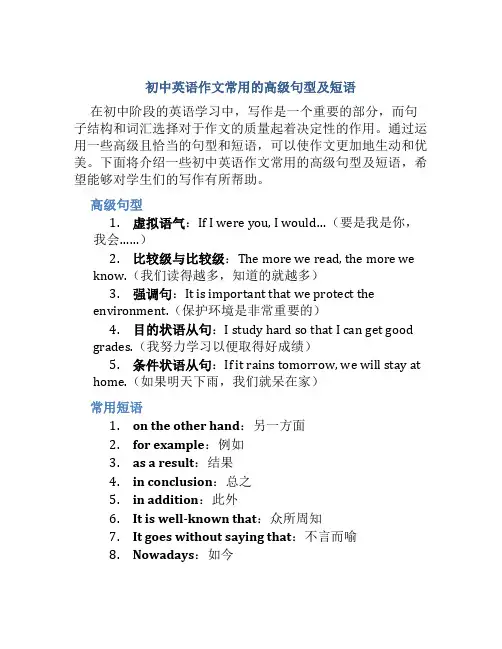
初中英语作文常用的高级句型及短语
在初中阶段的英语学习中,写作是一个重要的部分,而句子结构和词汇选择对于作文的质量起着决定性的作用。
通过运用一些高级且恰当的句型和短语,可以使作文更加地生动和优美。
下面将介绍一些初中英语作文常用的高级句型及短语,希望能够对学生们的写作有所帮助。
高级句型
1.虚拟语气:If I were you, I would…(要是我是你,
我会……)
2.比较级与比较级:The more we read, the more we
know.(我们读得越多,知道的就越多)
3.强调句:It is important that we protect the
environment.(保护环境是非常重要的)
4.目的状语从句:I study hard so that I can get good
grades.(我努力学习以便取得好成绩)
5.条件状语从句:If it rains tomorrow, we will stay at
home.(如果明天下雨,我们就呆在家)
常用短语
1.on the other hand:另一方面
2.for example:例如
3.as a result:结果
4.in conclusion:总之
5.in addition:此外
6.It is well-known that:众所周知
7.It goes without saying that:不言而喻
8.Nowadays:如今
通过运用这些高级句型和常用短语,可以使我们的作文更加地丰富多彩,表达更加清晰和有力。
希望同学们在写作中多多尝试,不断提升自己的写作水平,展现出更好的英语表达能力。
be accustomed to的用法一、概述“be accustomed to”是一个常用的英语短语,表示某人习惯于某种行为或状态。
在句子中,它通常用作谓语动词,表示某人已经养成了某种习惯。
二、用法详解1. 词义理解:be accustomed to意为“习惯于”,其中的accustom为词根,表示“使习惯”。
2. 常用句型:be accustomed to doing sth. 表示“习惯于做某事”。
3. 常用搭配:常与be accustomed to搭配的动词有live,study,work等。
4. 固定短语:be/get used to doing sth. 表示“习惯于做某事”,其中to为介词,后接动词时需使用动名词形式。
5. 常见用法:be accustomed to可以用于现在时、过去时和将来时。
6. 注意事项:使用be accustomed to时,要注意主语和be动词的时态保持一致。
三、例句分析1. He is accustomed to getting up early. 他习惯于早起。
这句话表明主语he已经养成了早起这个习惯。
2. When I moved here, I got used to the different climate. 我搬到这里后,习惯了这里不同的气候。
这句话表明主语是第一人称单数I,使用了get used to这个固定短语,表示逐渐习惯于新环境和新事物。
3. After a few days, we will be accustomed to the new environment. 几天后,我们将习惯于新环境。
这句话使用了将来时的be accustomed to,表示在未来我们会适应新环境。
四、拓展知识1. 与be accustomed to相关的短语还有“be used to”,其中to为介词,后接名词或代词。
例如:“The old man is used to the cold weather.”(老人已经习惯了寒冷的天气。
[短语、词组归纳]由动词开头构成的短语、词组很多。
复习时应分类处理:一、动词+介词照料… 看上去像……,look after …看…,look like … 1.look at…听…… 2.listen to…欢迎到…… 3.welcome to…4.say hello to …向……问好对……说话5.speak to…此类短语相当于及物动词,其后必须带宾语,但宾语无论是名词还是代词,都要放在介词之后。
二、动词+副词“动词+副词”所构成的短语义分为两类:A.动词(vt.)+副词1.put on 穿上 2.take off脱下 3.write down记下此类短语可以带宾语,宾语若是名词,放在副词前后皆可;宾语若是人称代词,只能放在副词的前面。
B.动词(vi)+副词。
1.come on赶快 2.get up起床 3.go home回家4.come in进来 5.sit down坐下 6.stand up起立此类短语属于不及物动词,不可以带宾语。
三、其它类动词词组1.close the door2.1ook the same3.go to work/class4.be ill5.have a look/seat6.have supper7.1ook young 8.go shopping 9.watch TV/games10. play games[介词短语聚焦]“介词+名词/代词”所构成的短语称为介词短语。
现将Unitsl-16常用的介词短语按用法进行归类。
1.in+语言/颜色/衣帽等,表示使用某种语言或穿着……。
2.in + Row/ Team/ Class/ Grade等,表示“在……排/队/班级/年级”等。
3.in the morning/ afternoon/ evening/ 表示“在上午/下午/傍晚”等一段时间。
5.in the tree表示“在树上 (非树本身所有)”;on the tree表示“在树上(为树本身所有)”。
高中英语词组固定搭配一、接不定式(而不接动名词)作宾语的24个常用动词afford to do sth。
负担得起做某事agree to do sth。
同意做某事arrange to do sth。
安排做某事ask to do sth。
要求做某事beg to do sth. 请求做某事care to do sth. 想要做某事choose to do sth. 决定做某事decide to do sth。
决定做某事demand to do sth. 要求做某事determine to do sth。
决心做某事expect to do sth。
期待做某事fear to do sth. 害怕做某事help to do sth. 帮助做某事hope to do sth。
希望做某事learn to do sth. 学习做某事manage to do sth。
设法做某事offer to do sth. 主动提出做某事plan to do sth。
计划做某事prepare to do sth. 准备做某事pretend to do sth。
假装做某事promise to do sth。
答应做某事refuse to do sth。
拒绝做某事want to do sth。
想要做某事wish to do sth。
希望做某事注:有些不及物动词后习惯上也接不定式,不接动名词:aim to do sth。
打算做某事fail to do sth. 未能做某事long to do sth. 渴望做某事happen to do sth。
碰巧做某事hesitate to do sth. 犹豫做某事struggle to do sth。
努力做某事二、接不定式作宾补的36个常用动词advise sb。
to do sth. 建议某人做某事allow sb. to do sth。
允许某人做某事ask sb. to do sth.请(叫)某人做某事bear sb. to do sth.忍受某人做某事beg sb. to do sth。
2023年中考英语必背重点短语句型[重温重点句型]1.So + be/助动词/情牵动词/主语.前面陈述的肯定情况也适于另一人(物)时,常用到这种倒装结构,表示“另一人(物)也如此。
”前面陈述的否定情况也适于另一人(物)时,常用“Neither/ Nor + be/助动词/情态动词+主语.”这种倒装结构。
注意:“So+主语+be/助动词/情态动词.”这一句型常用于表示赞同,进一步肯定对方的看法,表示“的确如此。
”“是呀。
”2.Turn right/left at the first/second/...crossing.这一指路的句型意为“在第一/二/......个十字路口向右/左拐。
”相当于T ake the first /second/...turning on theright/left.3.It takes sb.some time to do sth.此句型表示“干某事花了某人一段时间。
”其中的it是形式主语,后面的动词不定式(短语)才是真正的主语.4....think/find + it + adj. + to do sth.此句型中的it是形式宾语,不可用其它代词替代,形容词作宾语的补足语,后面的动词不定式(短语)才是真正的宾语。
5.What’s wrong with...?此句型相当于What’s the matter/ trouble with...?后跟某物作宾语时,意为“某物出什么毛病了?”后跟某人作宾语时,意为“某人怎么了?”6.too...to...在so...that...复合句中,that后的句子是否定句时,常与简单句too...to...(太......而不能......)进行句型转换。
在so...that...复合句中,that后的句子是肯定句时,常与简单句...enough to...进行句型转换.7.Sorry to hear that.全句应为I’m sorry to hear that. 意为“听到此事我很难过(遗憾)。
初中英语1000组固定词组及句型搭配(3年考点全囊括)(一)加-ingenjoy / like doing sth 喜欢做----spend....(in) doing sth 在做---花费---try doing 试着做------be busy doing sth 忙于做------finish doing sth 完成做----look forward to + doing sth 期待做----(现在进行时)be doing 正在做---Thank you for (doing) sth 为了--感谢你(二)加-todecide to do sth 决定去做-----ask (sb)to do 要求(某人)去做----It’s+adj +to do sth . 做---(怎么样)would like / want to do 想要做-----It takes sb sometime to do sth在做----花费----(三)加原形 let us golet / make sb do sth 让某人做某事be going to / will do sth (一般将来时态)(四)加-to 或-ing意思不同forget doing 忘记做过了-----(已做)remember doing记得做过了-----(已做)forget to do 忘记去做------(还没做)remember to do记得去做------(还没做)(五)加-to 或-ing意思相同begin / start to do sth = begin / start doing sth开始做------ (六) (A)动词+ 介词agree with同意....的意见(想法);符合help ... with ...帮助(某人)做(某事)listen to听.....get to到达.... . .fall off (从......)掉下base on以....(为)根据knock at /on敲(门、窗)laugh at嘲笑learn.. from 向...学习live on继续存在;靠...生活look after照顾,照看look at看;观看 look for寻找look like看起来像 pay for (sth.)付钱;支付 point at指示;指向point to指向....prefer to ...宁愿(选择);更喜欢quarrel with (和某人)吵架regard...as ...把....当作....;当作stop...from阻止.....做.....talk about说话;谈话;谈论talk with与......交谈think about考虑think of认为;想起B)动词+ 副词ask for请求;询问carry on坚持下去;继续下去cut down砍倒 clean up清除;收拾干净come down下来;落come along来;随同come in进来come on来吧;跟着来;赶快come over过来;顺便来访come out出来;出现;(花)开;发(芽) drop off放下(某物);下车eat up吃光;吃完fall behind落在......后面;输给别人fall down跌倒;从......落下find out查出(真相)get back回来;取回get down下来;落下;把......取下来get off下来;从......下来get on上(车) get up起床give up放弃go on继续go out出去go over过一遍;仔细检查grow up长大;成长hand in交上来hurry up赶快hold on (口语)等一等;(打电话时)不挂断look out留神;注意look over (仔细)检查look up向上看;抬头看pass on传递;转移到.... pick up拾起;捡起put away放好;把....收起来put on穿上;戴上;(戏剧等)上演;放(唱片等put down把(某物)放下来put up挂起;举起run away流失;逃跑;逃走rush out冲出去set off出发;动身;启程send up发射;把......往上送shut down把......关上sit down坐下slow down减缓;减速take off脱掉(衣服)take out取出throw about乱丢;抛撒trip over (被......)绊倒try on试穿(衣服、鞋等);试戴(帽子等)try out试验;尝试turn down关小;调低turn on打开(电灯、收音机、煤气、自来水等turn off关(电灯、收音机、煤气、自来水等)turn over (使)翻过来wake up醒来wear out把......穿旧;磨坏work out算出;制订出write down写下....C) be + 形容词+ 介词be angry with对(某人)发脾气be interested in对......感兴趣 be able to能;会be afraid of害怕be amazed at对......感到惊讶be excited about对......感到兴奋be filled with用......充满be full of充满......的be good at =do well in在....方面做得好;善于be late for迟到be made in在......生产或制造be made of由....组成;由....be pleased with对......感到满意be proud of以......自豪/高兴be used for用于D)动词+ 名词/ 代词beg one´s pardon请原谅;对不起do morning exercises做早操do one´s homework做作业enjoy oneself =have a good time过得快乐;玩得愉快give a concert开音乐会go boating去划船go fishing去钓鱼go hiking去徒步旅行go skating去滑冰go shopping (去)买东西have a cold (患)感冒have a cough (患)咳嗽 have a headache (患)头痛have a try尝试;努力have a look看一看have a rest休息have a seat (= take a seat ) 就坐;坐下have sports进行体育活动have supper吃晚餐hear of听说 hold a sports meeting举行运动会make a decision作出决定make a mistake犯错误make a noise吵闹make faces做鬼脸make friends交朋友make money赚钱take one´s place坐某人的座位;代替某人的职务teach oneself (=learn by oneself ) 自学watch TV看电视take photos照相take time花费(时间)take turns轮流E)动词+ 名词/ 代词/ 副词+ 介词catch up with赶上come up with找到;提出(答案、解决办法等)get on well with与......相处融洽give birth to生(孩子)help yourself / yourselves to自取;随便吃make room for给.....腾出地方play a joke on戏弄人;对人恶作剧speak highly of称赞say good bye to告别;告辞take an active part in积极参加take care of照顾;照料;注意F)其他类型be awake醒着的be born出生be busy doing忙着做come true实现do one´s best尽最大努力fall asleep睡觉;入睡go home回家 go on doing (sth.)继续做某事;尽力get married结婚 get together相聚go straight along 沿着...一直往前走had better (do)最好(做...)keep doing sth.一直做某事make sure确保;确认;查明make up one´s mind下决心1 (see 、hear 、notice 、find 、feel 、listen to 、 look at (感官动词)+ doeg :I like watching monkeys jump2 (比较级 and 比较级)表示越来越怎么样3 a piece of cake =easy 小菜一碟(容易)4 agree with sb 赞成某人5 all kinds of 各种各样 a kind of 一样6 all over the world = the whole world 整个世界7 along with 同……一道,伴随……eg : I will go along with you 我将和你一起去the students planted trees along with their teachers 学生同老师们一起种树8 As soon as 一怎么样就怎么样9 as you can see 你是知道的10 ask for ……求助向…要…(直接接想要的东西)eg : ask you for my book11 ask sb for sth 向某人什么12 ask sb to do sth 询问某人某事ask sb not to do 叫某人不要做某事13 at the age of 在……岁时eg:I am sixteen I am at the age of sixteen14 at the beginning of …………的起初;……的开始15 at the end of +地点/+时间最后;尽头;末尾eg : At the end of the day16 at this time of year 在每年的这个时候17 be /feel confident of sth /that clause +从句感觉/对什么有信心,自信eg : I am / feel confident of my spoken English I feel thatI can pass the test18 be + doing 表:1 现在进行时 2 将来时19 be able to (+ v 原) = can (+ v 原)能够……eg : She is able to sing She can sing20 be able to do sth 能够干什么 eg :she is able to sing21 be afraid to do (of sth ) 恐惧,害怕……eg : I'm afraed to go out at night I'm afraid of dog22 be allowed to do 被允许做什么eg: I'm allowed to watch TV 我被允许看电视 I should be allowed to watch TV我应该被允许看电视23 be angry with sb 生某人的气eg : Don't be angry with me24 be angry with(at) sb for doing sth为什么而生某人的气25 be as…原级…as 和什么一样eg : She is as tall as me 她和我一样高26 be ashamed to27 be away from 远离28 be away from 从……离开29 be bad for 对什么有害eg : Reading books in the sun is bad for your eyes 在太阳下看书对你的眼睛不好30 be born 出生于31 be busy doing sth 忙于做什么事be busy with sth 忙于……32 be careful 当心;小心33 be different from……和什么不一样34 be famous for 以……著名35 be friendly to sb 对某人友好36 be from = come from 来自eg :He is from BejingHe comes from BejingIs he from Bejing ?Does he come from Bejing ?37 be full of 装满……的be filled with 充满eg: the glass is full of waterthe glass is filled with water38 be glad+to+do/从句39 be going to + v(原)将来时40 be good at(+doing) = do well in 在某方面善长, 善于……41 be good for 对什么有好处eg : Reading aloud is good for your English42 be happy to do 很高兴做某事43 be helpful to sb 对某人有好处eg : Reading aloud is helpful to you 大声朗读对你有好处 Exercising is helpful to your bady 锻炼对你的身体有好处44 be in good health 身体健康45 be in trouble 处于困难中eg : She is in trouble They are in tronble46 be interested in 对某方面感兴趣47 be late for = come late to 迟到eg: Be late for class 上课迟到48 be like 像…… eg : I'm like my mother49 be mad at 生某人的气50 be made from 由……制成(制成以后看不见原材料)51 be made of 由……制成(制成以后还看得见原材料)52 be not sure 表不确定53 be on a visit to 参观54 be popular with sb 受某人欢迎55 be quiet 安静56 be short for 表**的缩写eg: 陶 is short for 陶俊杰57 be sick in bed 生病在床58 be sorry to do sth be sorry for sb eg : I am sorry for you59 be sorry to hear that60 be sorry to trouble sb eg : I am sorry to trouble you61 be strict in doing sth 严于做某事 eg : He's strict in obeying noles62 be strict with sb 对某人要求严格 eg: Some students are not strict with them selves 这些学生对自己不严格63 be strict with sb in sth 某方面对某人严格64 be supposed to do 被要求干什么65 be sure 表确定66 be sure of doing sth 对做某事有信心 eg: He is sure of winning I am sure of learning English well 67 be sure of sth 对做某事有信心 eg: I'm sure of my head (my teacher ) 我相信我的大脑(老师)68 be sure that sth 对做某事有信心 eg: I'm suer that he can pass the test 我相信他能通过考试69 be sure to do sth 一定会做某事eg: We are sure to pass the test 我们一定会通过这次考试 We are sure to learn English well 我们一定能学好英语70 be terrified of + 名/动doing 害怕……71 be terrified to do sth 害怕做某事72 be the same as …和什么一样73 be used to doing sth 习惯做某事eg: My father is used to getting up early 我爸爸习惯早起 He is used to sleeping in class 他习惯上课睡觉He is used to working hard He is used to hard work 他习惯努力工作74 be worth doing 值得做什么75 be(feel) afraid to do sth 害怕做某事 be afraid of sth 害怕某物 be afraid that 丛句76 because+句子 because of +短语eg : He was late because he had a headache He was late because of his headache77 begin to do = start to do 开始做某事 start…with…=begin…with…以什么开始什么eg : Let's begin the game with the song I begin to go home78 between…and…两者之间79 borrow sth from sb 向……借…… lend sth to sb ( lend sb sth 借给……什么东西 )eg : I borrowed a pen from him he lent a pen to me ( he lent me a pen )80 both = the same(as) = not different(from) 表相同81 bother 打扰 bother sb to do stheg : I'm sorry to bother you ,but can you tell me to way to the station我十分道歉打扰你,但是你能告诉我怎么去车站the problem has been bothering me for weeks 这个问题困扰了我几个周了He's bothering me to lend him money82 by the end of 到……为止83 call sb sth eg : We call him old wang84 care 关心 eg : Don't you care about this country's future ?你为什么不关心国家的未来85 catch up with sb 赶上某人86 chat with sb 和某人闲谈 take sb to + 地点带某人去某地87 come in 进来88 come over to 过来89 come up with 提出 eg: Can you come up with a good idea 你能想出一个好办法吗?90 communicate with sb 和某人交流91 consider + doing 考虑做什么 eg : Why not consider going to lu zhou 为什么不考虑去泸州?92 dance to 随着……跳舞 eg : She likes dancing to the music 她喜欢随着音乐跳舞93 decide to do sth 决定做某事94 do a survey of 做某方面的调查95 do better in 在……方面做得更好96 do wrong 做错97 Don't forget to do sth 不要忘了做某事98 Don't mind +doing /从句 /名词不要介意……99 each +名(单)每一个…… eg : Each student has many books 每一个学生都有一些书100 end up +doing101 enjoy +doing 喜欢102 escape from 从……逃跑eg: The prisoners have escaped from the prison 犯人从监狱里逃跑出来Some gas is escaping from the pipe 有一些气体从管子里冒出103 expect to do sth 期待做某事104 fall down 摔下来 fall off 从哪摔下来105 fall in love with sb /sth 爱上什么106 far from 离某地远 eg : The school is far from my home107 find +it +adj +to do 发现做某事怎么样108 find sb/sth +adj 发现什么怎么样? eg : I find the book interesting109 finish 完成+doing(名词)110 fit to sb = be fit for sb 适合某人111 forget to do 没有做而忘了 forget doing 做了而又忘了 eg: Don't forget to go home I forget closing door112 from…to…从某某到某某 eg: From me for her 113 get /have sth down 做完,被(别人)做……eg: I have my hair cut 我理了发(头发被剪了)Tom got his bad tooth pulled out 汤母把他的坏牙拔掉了(被牙医拔掉了)114 get a part-time job = find a part-time job115 get along well with sb = get on well with sb 与某人相处得好116 get along with sb = get on with sb 与某人相处117 get ready for = be ready for 为什么而准备 eg : I get ready for math I am ready for math118 get sb in to trouble 给某人麻烦119 get sb to do sth120 get…from…从某处得到某物121 give a talk 做报告 eg: He is give a tall122 give sth to sb give sb sth 给某人某物123 go fish 钓鱼 go swimming 游泳124 go on to do 去做下一件事 go on doing 继续做这件事125 go out away from go out of126 go to school 上学(用于专业的) go to the school 去学校(不一定是上学)127 good way to 好方法128 hate to do 讨厌没做过的事 hate doing 讨厌做过的事129 have a party for sb 举办谁的晚会130 have a talk 听报告谈一谈131 have been doing 现在完成进行时 eg : You have been talking You have been sleeping since132 have been to …( 地方)……去过某过地方 have gone to …(地方)去了某地还没回来133 have fun +doing 玩得高兴134 have sth to do 有什么事要做eg: I have a lot of homework to do 我有很多家庭作业要做I have nothing to do 我没什么事情做135 have to do sth 必须做某事136 have trouble (problem) (in) doing sth 做什么事情有麻烦137 have…time +doing138 have…(时间)…off 放……假 eg: I have month off 我请一个月得假139 hear sb +do/doing 听见某人做某事/正在做某事140 help a lot 很大用处141 help sb with sth \one's sth 帮助某人某事(某方面)help sb (to) do sth 帮助某人做某事142 hope to do sth 希望做某事143 How about(+doing) = What about(+doing)144 how do you like = what do you think of 你对什么的看法145 if : 是否=wethereg: I don't know if (wether) I should go to the party 我不知道我是否应该去参加晚会He don't know if (wether) we will arrive on time tomorrow morning 他不知道我们明天早上是否能准时到达146 if :如果,假如(全部接一般时态)+条件语态从句eg: I'll go to LuZhou if it does't rain 假如明天不下雨,我就去泸州If they change the plan they will let me know 假如他们要改变计划,他们会让我知道的I'll go to England ,if I have enough money next year 如果我明年由足够的钱,我就要去英国147 in one's opinion = sb think 某人认为148 in some ways 在某些方面149 in the end = finally(adv) 最后150 in the north of…什么在什么的北方(north 北sowth 南 west 西 east 东句型:1. …as soon as…一…就…Mary一见到她弟弟就会告诉他这个消息。
高考英语常用短语和句型归纳总结1. It is well known that...(众所周知)2. It is believed that...(人们认为)3. It is reported that...(据报道)4. It can be seen from the passage that...(从文章可以看出)5. According to the author/ the passage/ the data...(根据作者/文章/数据)6. In my opinion/ view/ point of view...(在我看来)7. As far as I'm concerned...(就我而言)8. It is obvious/ clear/ evident that...(很明显)9. I couldn't agree more/ less.(我完全同意/不同意)10. On the one hand, on the other hand...(一方面,另一方面)11. What's more/ Furthermore/ Moreover... (而且)12. In conclusion/ To sum up/ In a word...(总而言之)13. It is of great importance/ crucial/ significant/ essential to...(对于...是非常重要的)14. It is advisable/ advisable/ recommended to...(建议/推荐)15. There is no doubt that...(毫无疑问)16. It goes without saying that...(不言而喻)17. It seems that...(看起来好像)18. It turns out that...(结果是)19. It plays a vital role in...(在...中起着重要作用)20. It remains to be seen whether...(有待观察...是否)21. It is worth mentioning that...(值得一提的是)22. It is high time that...(早该是时候了)23. It is a common belief that...(普遍认为)24. It is the key to...(是...的关键)25. No matter what happens, we should...(无论发生什么,我们应该)。
常用英语短语、句型、搭配词典(一)About1. be about sth 忙于做某事,在干某事。
如:What are you about? 你在干(忙)什么? He knew what he was about. 他知道自己在干什么。
2. be about to do sth (1) 即将,马上(不与具体时间状语连用)。
如:Sit down, everyone. The film is about to start. 大家坐好,电影马上就要开发始了。
He was about to go to bed when the telephone rang. 他正要上床睡觉,这时电话铃响了起来。
(2) 打算,有意(主要见于美国英语中,且主要用于否定句)。
如:I’m not about to lend him any more money. 我不打算再借给他任何钱。
I’m not about to stop when I’m so close to success. 现在我已接近要成功了,我不打算放弃。
3. How [What] about (doing) sth? (1) 用于征求意见,意为:你认为(做)某事怎么样? 如:How about having a cup of tea? 喝杯茶怎么样? What about a game of table tennis? 打场乒乓球怎么样? (2) 询问情况或打听消息,意为:(做)某事怎么样? 如:What about that matter the other day? 早几天的那件事怎么样了? (3) 表示讽刺或挖苦,意为:你做某事又作何解释? 你做某事又怎么说? 如:A:I have never had an accident while driving. 我开车从未出过事。
B:How about that time you ran into a lamppost? 那次你撞到路灯上又怎么解释呢? 注:有时用于人。
如:I’m ready. What about you? 我已准备好了,你呢? How about Mother? Is she all right? 妈妈怎么样? 她好吗?Above1. above all 首先,最重要的是。
如:Above all, he was not honest. 最重要的是他不诚实。
But above all tell me quickly what I have to do now. 但现在首先要告诉我要去做什么。
2. be above one (one’s head) 太高深,无法理解。
如:The book is above the boy. 这个孩子读不懂这本书。
The lecture was above the heads of most students. 这个讲座大部分学生理解不了。
3. get above oneself 自高自大,自命不凡。
如:Don’t get above yourself. 不要自以为了不起。
Now he is getting far above himself. 他现在有变得狂妄了。
2014年执业医师考试指导临床执业医师口腔执业医师中医执业医师医科大考查课试题 2Absence1. in (during) one’s absence / in (during) the absence of (1) 当某人不在时。
如:Please look after my house in (during) my absence. 我不在的时候,请照看一下我的房子。
In the absence of the manager, I shall be in charge. 经理不在时,由我负责。
(2) (由于)缺乏某物,在缺乏某物的情况下。
如:Plants cannot exist in the absence of oxygen, nor can animals. 植物在无氧情况下不能生存,动物也是一样。
He was forced to accept it as true in the absence of other evidence. 由于没有别的证据,他只好认为那是真实的。
2. absence of mind 心不在焉。
如:Absence of mind may have bad results. 心不在焉可能会导致糟糕的结果。
Absent1. be absent from 不在,缺席。
如:He was absent from the meeting. 他没有参加会议。
比较(注意介词不同导致含义的变化):He is absent from Beijing. 他不在北京(而在别处)。
He is absent in Beijing. 他不在这里而在北京。
2. absent oneself from 缺席,不在。
如:He absented himself from the meeting. 他没有出席会议。
Why did you absent yourself from class yesterday? 你昨天为什么没来上课? Accident1. by accident 偶然地,无意中。
如:I found it by accident. 我是无意中找到它的。
Columbus discovered America by accident. 哥伦布偶然发现了美洲大陆。
注:by accident 主要用作状语,有时也用作表语。
如:Our meeting in Paris was by accident. 我们在巴黎见面是个巧合。
2. by accident of 因为……的机会,由于……的运气。
如:By accident of birth, he was rich. 他有幸生在富裕家庭。
3. without accident 平安无事地。
如:That night passed without accident. 一夜平安无事。
The ship arrived there without accident. 船平安到达那儿。
According1. according as 根据,随……而定(后接从句)。
如:Everyone contributes according as he is able. 每个人根据自己的能力作出贡献。
You will be praised or blamed according as your work is good or bad. 根据你工作的好坏,你会得到表扬或批评。
According as you are studying now, you won’t make much progress. 根据你现在学习情况来看,你不会有多大的进步。
2. according to (1) 根据,按照(主要引出状语)。
如:Everything went off according to plan. 一切都按照计划实现了。
According to my watch it is five o’clock. 照我的表,现在是五点钟。
Each man will be paid according to his ability. 每个人将根据他的能力获得报酬。
注:according to 后一般不接view(看法)和opinion(意见)这类词,也不接表示第一人称的代词(me, us)。
如:依我看,这部电影很不错。
正:In my opinion, the film is wonderful. 误:According to my opinion, the film is wonderful. 误:According to me, the film is wonderful. (2) 合乎,符合(主要引出表语)。
如:It is not according to his nature to give praise. 他本性不喜欢颂扬。
Account1. by (from) all accounts 据说,据报道,根据各方面所说。
如:He is a great football player, from all accounts. 据说他是个很不了起的足球运动员。
I’ve never been there but it is, by all accounts, a lovely place. 我从未去过那地方,但听说那地方很好。
2. on account of 因为,由于。
如:He couldn’t come on account of his illness. 他因病不能前来。
On account of holiday our store will be closed tomorrow. 由于明天是假日,我们商店停止营业。
3. on all accounts (on every account) 总之,无论如何。
如:On all accounts you must go. 总之,你一定得去。
It is best to stay here on every account. 总之,留在这儿是最好的。
4. on no accounts 绝不,无论如何都不。
如:My name must on no accounts be mentioned to anyone. 我的名字是绝不能向任何人提起的。
I will never do such a thing on any account. 无论如何我决不做这样的事。
若置于句首,句子要用倒装句式。
如:On no accounts must this switch be touched. 这个开关是绝不能触摸的。
5. on one’s account 为了某人的缘故。
如:Don’t put off the meeting on my account. 不要为了我而把会议推迟。
I didn’t tell her the news on her husband. 由于她丈夫的关系,我没有把这消息告诉她。
6. take sth into account 考虑,注意。
如:You should take the expenses into account. 你应该把费用考虑进去。
When judging his performance, don’t take his age into account. 评定他的表现时,不必考虑他的年龄。
有时sth 较长,也可放在后面。
如:We must take into account the boy’s long illness. 我们必须考虑到这个孩子已经病了很久。